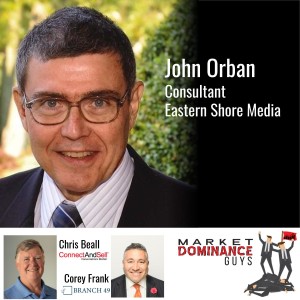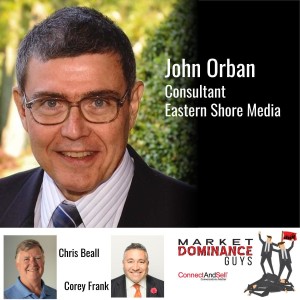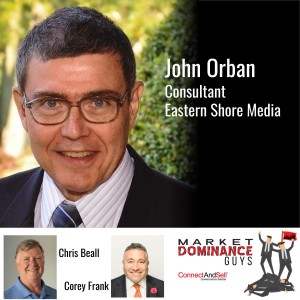Market Dominance Guys
Guest: John Orban
Episodes

Tuesday Feb 22, 2022
EP121: Beware the Jabberwock, my son!
Tuesday Feb 22, 2022
Tuesday Feb 22, 2022
How do you de-risk your company? Marketing and business consultant John Orban and our Market Dominance Guys, Chris Beall and Corey Frank, wind up their four-part conversation by offering our listeners a great deal of advice about how to balance potential risk. These three sales scholars delve into the potential problems of forecasting your company’s success, the possible perils of determining the market value of your sales pipeline, and the pitfalls of the practice of inflating your sales and revenue prior to a reporting period, which is known as “stuffing the channel.” “I give myself good advice, but I seldom follow it,” admits Lewis Carroll’s famous character, Alice. In this vein, Chris warns that being in love with your brilliant idea for a business can make you into your great idea’s zombie — ignoring all you’ve learned about de-risking. Save yourself from that fate by listening to this week’s Market Dominance Guys’ episode, “Beware the Jabberwock, my son!”
The complete poem by Lewis Carroll is here.
About Our Guest
John Orban brings his background as a MetLife sales rep and as an administrator of computer networks to his current career as a marketing and business consultant for creative professionals.

Tuesday Feb 08, 2022
EP120: Six impossible things before breakfast
Tuesday Feb 08, 2022
Tuesday Feb 08, 2022
Do you believe that the cold calls you make are an interruption in your prospect’s day? Well, they definitely are! But to what purpose? Marketing and business consultant John Orban and our Market Dominance Guys, Chris Beall and Corey Frank, use part three of a four-part conversation to take this inherent problem in sales and look at it from a different angle. Chris cites the podcast he did with ConnectAndSell’s Matt Forbes, whose epiphany about how belief in the opportunity he offers his prospects changed everything about the way he conducts cold calls. John cites the epiphany he experienced reading Betty Edwards’ book, Drawing on the Right Side of the Brain, when he discovered how a book can change your awareness of ordinary things and lead you to look at your world differently. Chris touts Geoffrey Moore’s book, Crossing the Chasm, for opening his eyes and engendering a new belief in empathy and how employing that essential quality can help you build trust with a prospect. And, with another of his insightful summations, Corey ties all these ideas together with the advice to “major in minor things.” Be prepared to garner insights of your own as our three dedicated students of sales and of life share with you their practice — just like Alice’s — of believing “Six impossible things before breakfast” on this episode of the Market Dominance Guys.
Drawing on the Right Side of the Brain - Betty Edwards
Crossing the Chasm - Geoffrey A. Moore
About Our Guest
John Orban brings his background as a MetLife sales rep and as an administrator of computer networks to his current career as a marketing and business consultant for creative professionals.

Wednesday Feb 02, 2022
EP119: Curiouser and Curiouser
Wednesday Feb 02, 2022
Wednesday Feb 02, 2022
Would you expect introverts to be good at cold calling? Oddly enough, they aren’t just good —they’re great! Today, we delve into why introverts make great salespeople in this second part of a four-part conversation between marketing and business consultant John Orban and our Market Dominance Guys, Chris Beall and Corey Frank. It turns out that introverts’ reluctance to push themselves forward makes them less likely to take over a cold-call conversation, and this allows prospects to talk. And when prospects talk — shazam! — we learn things about them that help us become partners on their sales journey. This insight sparked John to ask Chris the question, “What role do you think curiosity plays in the process of making a cold call?” Listen in to learn the whys and wherefores of this valuable cold-calling asset on this Market Dominance Guys’ episode, “ ‘Curiouser and Curiouser.’ ”
About Our Guest
John Orban brings his background as a MetLife sales rep and as an administrator of computer networks to his current career as a marketing and business consultant for creative professionals.

Tuesday Feb 01, 2022
EP118: Of Cabbages and Kings — and Blue Whales
Tuesday Feb 01, 2022
Tuesday Feb 01, 2022
“The time has come,” the Walrus said, “to talk of many things.” Our podcast guest, John Orban, is currently a marketing and business consultant who spent 24 years honing his sales skills as a rep for MetLife. Today, John joins our Market Dominance Guys, Chris Beall and Corey Frank, to talk of many sales- and life-related things. In this first episode of a four-part conversation, John, Chris, and Corey touch on the trickiness of successfully communicating an idea, on the importance of thinking but not over-thinking, on resisting the temptation to make things complex, and finally, on the math employed in sales and, thus, market domination. There’s even a bit about the stability of cruise ships. Seriously. Many things! And these three sales guys are just getting started, so don’t miss the fun in this Market Dominance Guys’ episode, “Of Cabbages and Kings — and Blue Whales.”
About Our Guest
John Orban brings his background as a MetLife sales rep and as an administrator of computer networks to his current career as a marketing and business consultant for creative professionals.